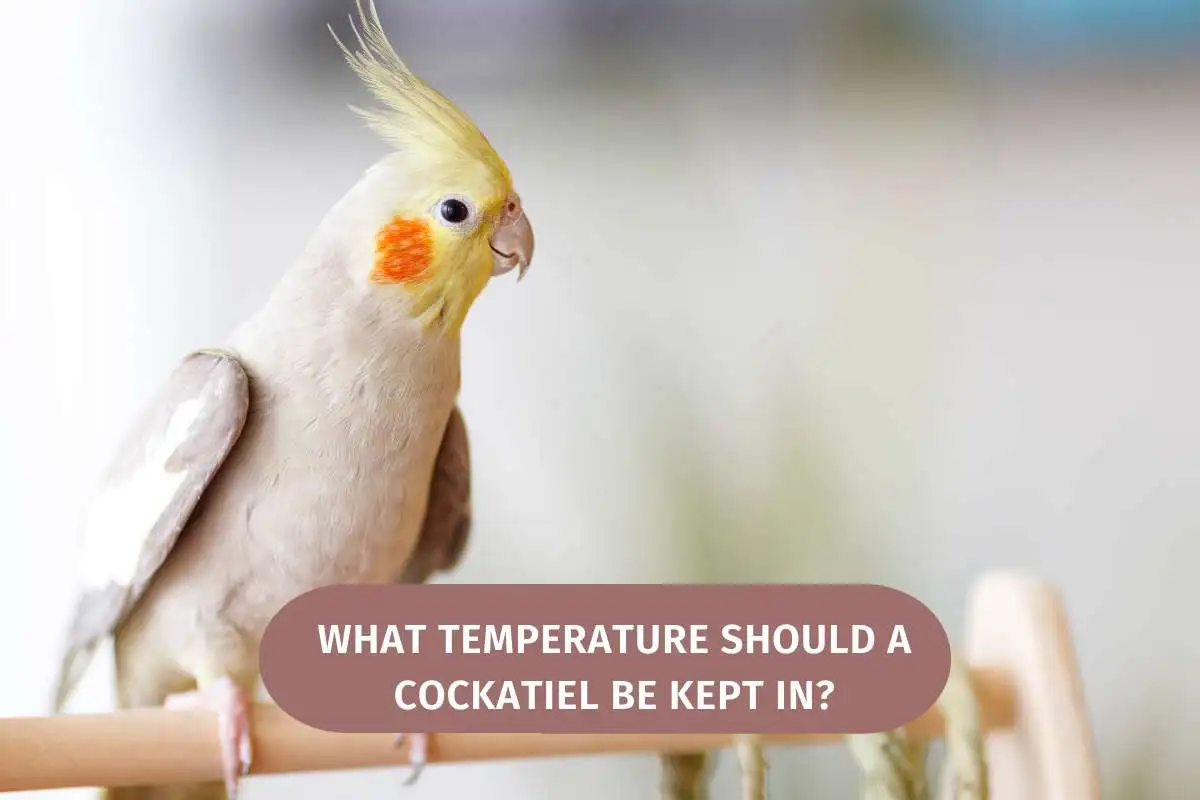One crucial factor to consider when caring for a cockatiel is the temperature of its environment. These birds are native to a warm, arid climate and are sensitive to extreme temperatures.
What Temperature Should A Cockatiel Be Kept In? A cockatiel should be kept at a temperature between 65 and 85 degrees Fahrenheit (18 and 29 degrees Celsius). This range provides a comfortable and safe environment for the bird.
Sudden temperature changes can be stressful for the bird and may cause health problems. If the temperature in your home drops below 65 degrees Fahrenheit, you may need to provide additional heating for your cockatiel.
A small space heater or heat filament lamp placed near the bird’s cage can help to maintain a comfortable temperature.
It is also essential to provide your cockatiel with protein-based food to keep them healthy and warm. Also, keep water in their cage; water is necessary for regulating body temperature.
Remember, a comfortable and stable temperature is vital to caring for a cockatiel. Maintaining a warm, consistent environment can help your cocktail enjoy a happy and healthy life.
Do cockatiels need to be kept warm?
Yes, cockatiels need to be kept warm to maintain their health and well-being. These birds are native to a warm, arid climate and are sensitive to extreme temperatures.
It is also essential to avoid sudden temperature changes, as this can be stressful for the bird and may cause health problems.
Overall, providing a warm and stable environment is essential for the health and happiness of your cockatiel.
What temperature is too cold for a cockatiel?
Temperatures below 65 degrees Fahrenheit (18 degrees Celsius) may be too cold for a cockatiel and can lead to health problems. These birds are native to a warm climate and are not adapted to withstand cold or freezing temperatures.
Exposure to cold temperatures can cause the bird to become stressed and may lead to respiratory problems, weakened immunity, and other health issues.
Is 80 degrees too hot for a cockatiel?
While 80 degrees Fahrenheit (27 degrees Celsius) is within the recommended temperature range for a cockatiel, it is still on the high end but not too hot for them.
Exposure to excessively hot temperatures can cause the bird to become stressed and may lead to health problems such as dehydration, heat stroke, and other issues.
If the temperature in your home is above 85 degrees Fahrenheit (29 degrees Celsius), you may need to provide additional cooling for your cockatiel. It can be done by placing a fan near the bird’sbird’s cage or by providing a shallow dish of cool water for the bird to stand in.
How do I keep my cockatiel warm at night?
There are several ways to keep your cockatiel warm at night, including:
- Place a small space heater or heat lamp near the bird’sbird’s cage. It will provide additional warmth and help to maintain a comfortable temperature.
- Cover the bird’sbird’s cage with a light blanket or towel at night. It will help to retain heat and provide some insulation.
- Move the bird’sbird’s cage to a warmer location in the house. It could be near a radiator, heating vent, or a room that stays warmer at night.
- Provide your cockatiel with a high-quality, insulated cage. This will help to keep the bird warm and protect them from drafts and cold temperatures.
- Place a hot water bottle or heating pad near the bird’sbird’s cage. This will provide a source of warmth that the bird can move closer to or away from as needed.
- Increase the amount of food and water you provide for your bird at night. This will help to raise the bird’sbird’s body temperature and keep them warm.
- Provide your cockatiel with plenty of toys and activities to keep them entertained at night. This will help to keep the bird active and prevent them from becoming cold.
- Consider purchasing a bird-safe snuggle pouch or sleeping tent for your cockatiel. These products provide a warm, enclosed space for the bird to sleep in and can help to keep them warm at night.
- If all else fails, you can also try sleeping with your bird in a safe and secure location. It will provide the bird with your body heat and may help to keep them warm at night.
Should I cover my cockatiel cage at night?
Covering your cockatiel’scockatiel’s cage at night is generally recommended to provide them with a sense of security and comfort. Covering the cage can also help maintain a stable temperature and prevent drafts, which can harm your bird.
When covering the cage, it is important to use a light, breathable material such as a towel or lightweight blanket. Heavy or thick materials can block too much air and cause the bird to become overheated and suffocate. Leaving enough space for the bird to move freely and access food and water is also essential.
How can I tell if my cockatiel is cold?
There are several signs that you can look for to determine if your cockatiel is cold, including:
- Shivering or shaking: If your bird is shivering or shaking, this may be a sign that they are cold. It is a natural response to cold temperatures that helps the bird to generate heat and keep warm.
- Fluffed-up feathers: Cockatiels will fluff up their feathers to trap heat and keep warm when they are cold. If your bird’sbird’s feathers are fluffed up, this may be a sign that they are feeling cold.
- Lack of activity: Cold temperatures can make your bird lethargic and inactive. If your cockatiel is less active than usual and seems sluggish or slow, this may be a sign that they are cold.
- Reduced appetite: Cold temperatures can affect your bird’sbird’s metabolism and may cause them to eat less. If your cockatiel is not eating as much as usual or seems uninterested in food, this may be a sign that they are cold.
Cockatiel cold treatment
If a cockatiel shows cold symptoms, it is best to take it to a veterinarian for proper treatment. The veterinarian can determine the cause of the cold and provide appropriate treatment.
It is not recommended to treat the cold yourself, as improper treatment can lead to further complications.
Additionally, cockatiels are sensitive to medications, so it is important to give them medications that a veterinarian has prescribed. If your cockatiel is showing cold symptoms, it is important to contact a veterinarian as soon as possible.
How long can a cockatiel survive in the cold?
Cockatiels are not well-adapted to survive in cold temperatures and can become stressed and ill if exposed to the cold for extended periods.
If exposed to cold temperatures, a cockatiel may become lethargic and inactive and develop respiratory problems, weakened immunity, and other health issues.
The length of time that a cockatiel can survive in the cold will depend on various factors, such as the bird’s age and health, temperature, and availability of food and water.

